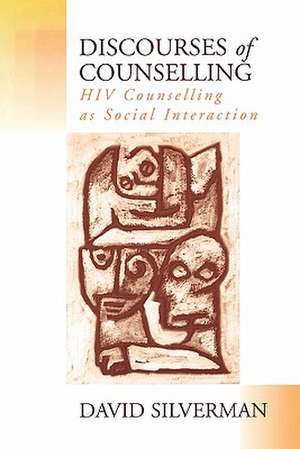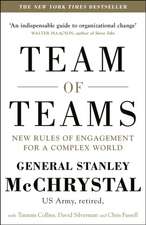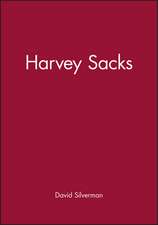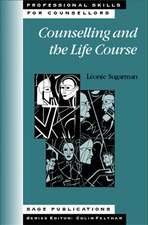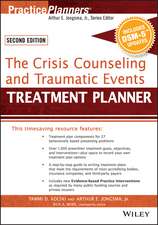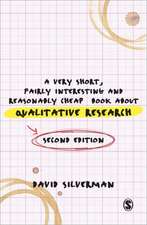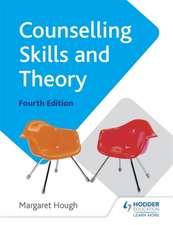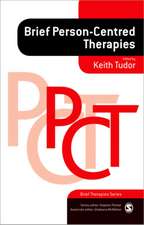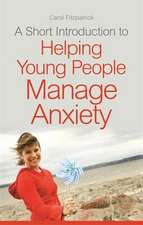Discourses of Counselling: HIV Counselling as Social Interaction
Autor David Silvermanen Limba Engleză Paperback – 28 noi 1996
| Toate formatele și edițiile | Preț | Express |
|---|---|---|
| Paperback (1) | 485.68 lei 43-57 zile | |
| SAGE Publications – 28 noi 1996 | 485.68 lei 43-57 zile | |
| Hardback (1) | 1547.99 lei 43-57 zile | |
| SAGE Publications – 15 dec 1996 | 1547.99 lei 43-57 zile |
Preț: 485.68 lei
Nou
Puncte Express: 729
Preț estimativ în valută:
92.94€ • 97.28$ • 77.35£
92.94€ • 97.28$ • 77.35£
Carte tipărită la comandă
Livrare economică 31 martie-14 aprilie
Preluare comenzi: 021 569.72.76
Specificații
ISBN-13: 9780803976627
ISBN-10: 0803976623
Pagini: 256
Dimensiuni: 156 x 234 x 14 mm
Greutate: 0.37 kg
Ediția:First Edition
Editura: SAGE Publications
Colecția Sage Publications Ltd
Locul publicării:London, United Kingdom
ISBN-10: 0803976623
Pagini: 256
Dimensiuni: 156 x 234 x 14 mm
Greutate: 0.37 kg
Ediția:First Edition
Editura: SAGE Publications
Colecția Sage Publications Ltd
Locul publicării:London, United Kingdom
Recenzii
`This study of the tacit communicative skills that inform verbal interaction between counsellors and clients in various kinds of HIV counselling... primarily informed by conversation analysis... is sensitive to the requirements of counsellors who will want to know the practical benefits for them which emerge from this kind of study of interaction in counselling sessions' - British Journal of Sociology
`Many texts claim to be based in, or to be written for, the scientist-practitioner (or the practitioner-researcher), yet seldom have I read a book that reaches this audience in such a useful and effective manner. This book not only describes how research can inform practice, but offers the experience as you read it... I was particularly struck by the sensitivity to language that Silverman illustrates throughout the book. I found that, without trying, I was listening to my clients with a different attunement, somehow noticing subtle nuances with a greater range of possible interpretations... Regardless of paradigm, the professional who has a role as a listener will be enriched by reading this book and thinking seriously about their own practice' - The Psychologist
`This book is the result of several years' research into HIV counselling... a collage of intertwining and reflexive segments on different aspects of HIV counselling... Talk about sex and death can be highly absorbing, especially when presented with the fastidious exactitude of CA, and here the transcriptions... are of a rare quality. Introducing and addressing such "delicate" topics... is easier if the counsellor is "in control of" the agenda. Thus there is often an ambiguity in the interactive status of interviews which lean on the one hand towards the patient-centred approach, and on the other the retaining of control by the professional... While power and resistance may be ubiquitous in everyday life, it is through the detailed examination of their local reproduction in talk that we are able to gain empirical knowledge of their actual form and practical implications. In few areas of contemporary life could this assertion be made more precisely than in the discourses on sexuality which Silverman examines in this study' - Journal of Sociolinguistics
`This book reports the author's conversation analyses (CA) of counselling sessions, largely in HIV testing clinics in the USA and UK... Throughout, the text contains examples from actual interactions illustrating the sometimes clever and subtle skills deployed by the speakers... It is perhaps in this detail that the quality of the book lies. In this respect the author's claims for the superiority of CA's transcription techniques above the invented examples and tidied up transcripts of most existing accounts of counselling are borne out. For practitioners reading the book, it must be like looking into a mirror for the first time, perceiving just what it is they have always done without realising it... The view that meanings of utterances can be understood by attending to the preceding moves is also strongly supported, the relevant material being made fully available to the reader; herein lies the chief claim of CA to fulfil conventional standards of scientific quality' - Medical Sociology News
`Many texts claim to be based in, or to be written for, the scientist-practitioner (or the practitioner-researcher), yet seldom have I read a book that reaches this audience in such a useful and effective manner. This book not only describes how research can inform practice, but offers the experience as you read it... I was particularly struck by the sensitivity to language that Silverman illustrates throughout the book. I found that, without trying, I was listening to my clients with a different attunement, somehow noticing subtle nuances with a greater range of possible interpretations... Regardless of paradigm, the professional who has a role as a listener will be enriched by reading this book and thinking seriously about their own practice' - The Psychologist
`This book is the result of several years' research into HIV counselling... a collage of intertwining and reflexive segments on different aspects of HIV counselling... Talk about sex and death can be highly absorbing, especially when presented with the fastidious exactitude of CA, and here the transcriptions... are of a rare quality. Introducing and addressing such "delicate" topics... is easier if the counsellor is "in control of" the agenda. Thus there is often an ambiguity in the interactive status of interviews which lean on the one hand towards the patient-centred approach, and on the other the retaining of control by the professional... While power and resistance may be ubiquitous in everyday life, it is through the detailed examination of their local reproduction in talk that we are able to gain empirical knowledge of their actual form and practical implications. In few areas of contemporary life could this assertion be made more precisely than in the discourses on sexuality which Silverman examines in this study' - Journal of Sociolinguistics
`This book reports the author's conversation analyses (CA) of counselling sessions, largely in HIV testing clinics in the USA and UK... Throughout, the text contains examples from actual interactions illustrating the sometimes clever and subtle skills deployed by the speakers... It is perhaps in this detail that the quality of the book lies. In this respect the author's claims for the superiority of CA's transcription techniques above the invented examples and tidied up transcripts of most existing accounts of counselling are borne out. For practitioners reading the book, it must be like looking into a mirror for the first time, perceiving just what it is they have always done without realising it... The view that meanings of utterances can be understood by attending to the preceding moves is also strongly supported, the relevant material being made fully available to the reader; herein lies the chief claim of CA to fulfil conventional standards of scientific quality' - Medical Sociology News
Cuprins
PART ONE: INTRODUCTION
What Is HIV Counselling?
Basic Methodological Issues
PART TWO: COMMUNICATION IN HIV COUNSELLING
Communication Formats in HIV Counselling
PART THREE: DELICATE DISCUSSIONS
The Construction of `Delicate' Objects in Counselling
Offering the Agenda to the Patient
Delays in Delivering Test Results in Post-HIV-Test Counselling Interviews
PART FOUR: ADVICE-GIVING
Advice-Giving and Advice-Reception
Resisting Advice
Concealing Advice
The Advice-as-Information Sequence
PART FIVE: CONCLUSION
Counselling as a Discourse of Enablement
Implications for Practice
What Is HIV Counselling?
Basic Methodological Issues
PART TWO: COMMUNICATION IN HIV COUNSELLING
Communication Formats in HIV Counselling
PART THREE: DELICATE DISCUSSIONS
The Construction of `Delicate' Objects in Counselling
Offering the Agenda to the Patient
Delays in Delivering Test Results in Post-HIV-Test Counselling Interviews
PART FOUR: ADVICE-GIVING
Advice-Giving and Advice-Reception
Resisting Advice
Concealing Advice
The Advice-as-Information Sequence
PART FIVE: CONCLUSION
Counselling as a Discourse of Enablement
Implications for Practice
Notă biografică
Descriere
In this book, David Silverman offers a fully researched and analytically sensitive account of how counselling, as a process, is dynamically constructed through the interaction of counsellor and client. Drawing on research on counselling of clients undergoing an HIV test, the author explores the ways in which conversations between counsellors and clients reflect, embody and subtly alter assumptions about the purpose, method and practice of counselling.
